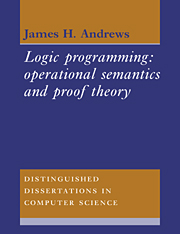6 - Summary and Future Directions
Published online by Cambridge University Press: 23 November 2009
Summary
This thesis has taken as its object of study the control-discipline variants of a simple logic programming language equivalent to Horn clause logic programming. It has classified and logically characterised the set of successful and failing queries of these variants of the language.
I have given an operational semantics, SOS, of which variants correspond to the parallel “and” and “or”, sequential “and”, sequential “or”, and sequential “and” and “or” control disciplines. This operational semantics homogenises the treatment of the control disciplines by incorporating control information (such as the failure-backtrack mechanism of seqeuntial systems) into the operational semantics. (Some of the variants of SOS have equivalent compositional operational semantics, which I have given.) I have also classified the queries into those succeeding and those failing in each of the control disciplines, and have proven the equivalence of some of these classes.
I have then used a sequent calculus framework, in which the elements of sequents are assertions about the success or failure of queries, to give a logical analysis of these classes of queries. Three calculi are given; they share a common set LKE of rules for classical logic with equality as syntactic identity, and differ in the set of axioms which characterise the behaviour of queries.
LKE+PAR characterises the queries which succeed in parallel-or systems, and those which fail in parallel-and systems;
LKE+SEQ characterises the queries which succeed in the sequential-and, sequential-or system, and those which fail in sequential-and systems;
LKE+PASO characterises the queries which succeed in the parallel-and, sequential-or system.
- Type
- Chapter
- Information
- Logic ProgrammingOperational Semantics and Proof Theory, pp. 83 - 88Publisher: Cambridge University PressPrint publication year: 1992

